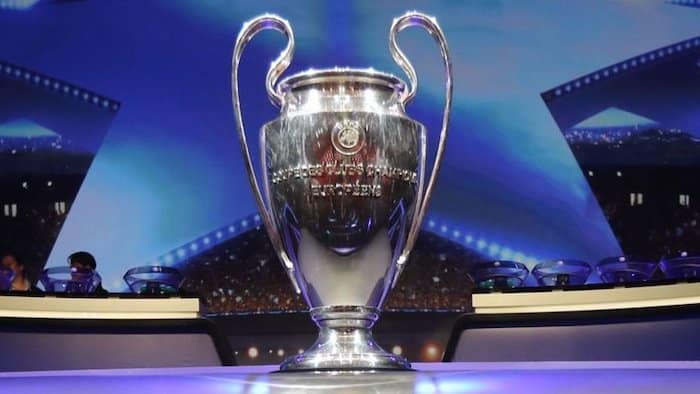A decision on a new format for the Champions League has been delayed by a disagreement over the level of control clubs have over the competition’s commercial rights, according to reports.
An expanded 36-team competition to begin in 2024 had been set for approval by Uefa’s executive committee on Wednesday, but will now not be rubber-stamped until the next exco meeting on 19 April at the earliest.
It is understood the board of the European Club Association (ECA), which represents the views of the continent’s most powerful clubs, was split and could not give its formal support to the Uefa proposal when it met on Monday because some clubs remain convinced they should control the commercial aspects of the competition, such as television and sponsorship rights.
An ECA statement published later on Tuesday read: ‘The ECA executive board met on March 29 to continue its work across a number of important areas relating to the current status and development of the European club landscape.
‘The board reviewed in detail the current state of play relating to discussions and plans with UEFA for the post-2024 period. Discussions focused on the future of the UEFA club competitions [UCCs] along with ongoing talks between ECA and UEFA around their future stakeholder relations given that the current memorandum of understanding which enshrines all aspects of this relationship is also set for renewal in 2024.
‘The executive board, which is made up of 28 members and representatives from European clubs representing ECA members across all four ECA subdivisions, unanimously agreed that it was not yet in a position to formally endorse key changes to the UCCs for the period post-2024 in isolation.
‘The executive board believes that if European football is to meet the challenges it currently faces, the foundations for ECA and UEFA’s future relationship also need to be given due consideration at the same time.
‘The executive board is fully committed to working with UEFA over the coming weeks on all topics and remains confident of reaching successful outcomes, which will be crucial in ensuring European club football’s rebuild and long-term sustainability.’
Uefa said on Wednesday: ‘UEFA can confirm that a meeting of the executive committee will take place tomorrow, Wednesday, March 31, and that the future of club competitions post-2024 will be one of the topics discussed.
‘However, any official decision in this respect will only be made at the next UEFA executive committee meeting on April 19, in order to finalise ongoing discussions.’
Commercial control of the new-look Champions League remains a key demand for some of Europe’s biggest clubs, who feel they have already made concessions in other areas.
Earlier plans for a new Champions League format floated by the ECA in 2019 included a greater emphasis on qualification based on European rather than domestic performance, and the idea of some matches being played at weekends to increase revenue because it would make the competition more attractive to broadcasters in the United States and the Far East.
Those ideas have, to a great extent, been diluted out of the new proposals, but in return clubs are hanging on to the idea of greater ownership of the Champions League as a product.

Manchester United executive vice-chairman Ed Woodward, who sits on the ECA board and Uefa’s club competitions committee, told club investors earlier this month that he anticipated Uefa’s final proposal would ‘include a greater involvement of clubs in the governance and control of the competition’.
When asked about discussions over the setting up of a new commercial vehicle earlier this month, Uefa said: ‘Ahead of every cycle of club competitions, UEFA engages with its stakeholders to determine how to maximise their success.’
At the time that the discussion of a new commercial venture came to light, on 19 March, a key fans group warned Uefa had to stand its ground or it would be allowing a de facto European Super League to take shape.
Ronan Evain, the executive director of Football Supporters Europe (FSE), told the PA news agency: ‘If Uefa’s strategy is to give a little every three years to the big clubs so that they don’t break away, instead of giving away control of the competitions overnight it will happen within 10 years, but the result will be the same.
‘The model that we have seen will lead within a few years to a “de facto” closed league. Maybe not 100% closed, but it will only reinforce the wealth and influence of the big clubs.’
Uefa’s ‘Horizon 2024’ proposals included the scrapping of the 32-team, eight-group format and replacing it with one 36-team league, where each team would play 10 matches on a seeded basis under the so-called ‘Swiss model’.
ECA president Andrea Agnelli had described the format as ‘ideal’ and it had been expected that the measures would be pushed through on Wednesday, before the commercial disagreement.
The Premier League is understood to have concerns about the impact of the format on the domestic calendar, particularly the fact that the competition would spill into January which has traditionally been reserved for domestic club football only.
The changes to qualification are also an issue for the Premier League.
Uefa is proposing that two of the extra four places in the group phase would be awarded to the teams with the strongest European pedigree – their club co-efficient – who missed out on Champions League qualification via the conventional route, provided the club had done enough to qualify for one of Uefa’s other two competitions.
This could lead to a team in seventh leapfrogging teams finishing fifth or sixth in the Premier League into a more lucrative competition, which the English top flight fears would affect the integrity of its competition.





